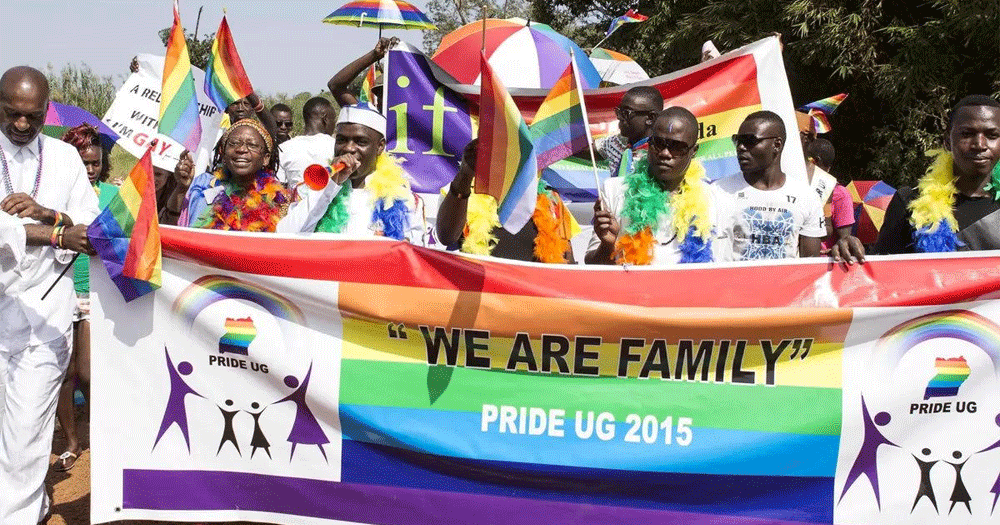After a revised version of the 2023 Anti-Homosexuality Bill was passed by the Ugandan Parliament on May 2, a leading LGBTQ+ activist from the country spoke out against it, describing the climate of fear that the community is experiencing as a consequence of the new legislation.
The 2023 Anti-Homosexuality Bill was first passed by the Ugandan parliament on March 21, and if made law, it would have further criminalised LGBTQ+ people, imposing the death penalty for so-called “aggravated homosexuality”. The bill has been dubbed the world’s harshest law targeting the LGBTQ+ community, in a country where same-sex relations are already illegal under a colonial-era penal code retained after independence.
After the parliament approved the bill, it triggered a national outcry and calls on Ugandan President Yoweri Museveni to reject the legislation. Some Ugandan politicians opposed to the bill criticised it, saying that “it contains provisions that are unconstitutional” and “criminalises individuals instead of conduct that contravenes all known legal norms”.
For this reason, President Museveni decided to send the legislation back to parliament, asking for amendments to strengthen it and ensure that it couldn’t be challenged in court in the future. While the Ugandan president asked MPs to improve the legislation, a spokesperson stated that Museveni was not opposed to the punishments proposed in the anti-LGBTQ+ bill.
The new version of the bill approved by the parliament in Uganda contained only a few amendments from the original. While lawmakers eliminated a provision that criminalised those who simply identify as LGBTQ+, which was deemed unconditional, the new bill maintains most of its harshest measures, including the death penalty for “aggravated homosexuality”.
Moreover, it introduces a clause that imposes a 20-year prison term for campaigning for LGBTQ+ rights. Activists have denounced such a provision, arguing that it will criminalise any form of advocacy for the rights of queer individuals in Uganda.
Don’t Prosecute; Protect LGBTIQ+ Ugandans: The world is watching. RT to show your support for our LGBT+ siblings in Uganda. ?? #SayNoToAHB23 @Parliament_UG @StateHouseUg @KagutaMuseveni @OPMUganda pic.twitter.com/MKvQO2Vcd1
— All Out (@AllOut) April 25, 2023
As reported by PinkNews, Executive Director of Sexual Minorities Uganda, Frank Mugisha, said he now expects violence against LGBTQ+ people to increase dramatically in the country. “Personally, I think the changes don’t amount to anything. It is vague and broad when it comes to talking about promotion of homosexuality and what that looks like,” he said.
Mugisha also spoke about the consequences that the bill already has on the lives of LGBTQ+ Ugandans, saying that the association received calls from individuals who had been contacted by employers who threatened to fire them or landlords who wanted to evict them. “There’s a lot of fear. I’m getting a lot of messages from people telling me they want to flee the country. They’re worried about what’s next if the bill is signed,” he said.
The activist also spoke against claims made by President Museveni, who praised legislators for the bill and for not succumbing to international pressure, saying that Western nations were “trying to impose their practices on other people”. The president’s words were also echoed by parliament speaker Anita Among after the bill was passed for the second time, who said: “Let’s protect Ugandans, let’s protect our values, our virtues. We have a culture to protect. The Western world will not come and rule Uganda.”
Outrage as #Uganda #parliament passes bill punishing ‘aggravated homosexuality’ with death
Uganda’s parliament has passed one of the world’s strictest anti #LGBT+ laws, sparking outrage from activists and #NGOs pic.twitter.com/PTaBvFLqHA— CHAUDHRY IMRAN (@chimran55) May 4, 2023
However, Mugisha highlighted how “members of parliament are not acting on their own – they’re acting on behalf of American evangelicals and the Russians”, citing evidence that significant amounts of money were channelled from abroad to fund Uganda’s anti-gender movement.
“The language in the legislation is not from our members of parliament – the language is similar to what we’re seeing in the US and other countries from extreme anti-gay groups and evangelicals,” the activist explained.
“The LGBTQ community is already vulnerable and this bill makes it even more difficult for LGBTQ persons who are already persecuted,” concluded Mugisha. “It could risk genocide for the LGBTQ+ community if this bill is signed.”
The bill is now set to return to President Museveni, who has the authority to either veto it or sign it into law.
© 2023 GCN (Gay Community News). All rights reserved.
Support GCN
GCN is a free, vital resource for Ireland’s LGBTQ+ community since 1988.
GCN is a trading name of National LGBT Federation CLG, a registered charity - Charity Number: 20034580.
GCN relies on the generous support of the community and allies to sustain the crucial work that we do. Producing GCN is costly, and, in an industry which has been hugely impacted by rising costs, we need your support to help sustain and grow this vital resource.
Supporting GCN for as little as €1.99 per month will help us continue our work as Ireland’s free, independent LGBTQ+ media.
